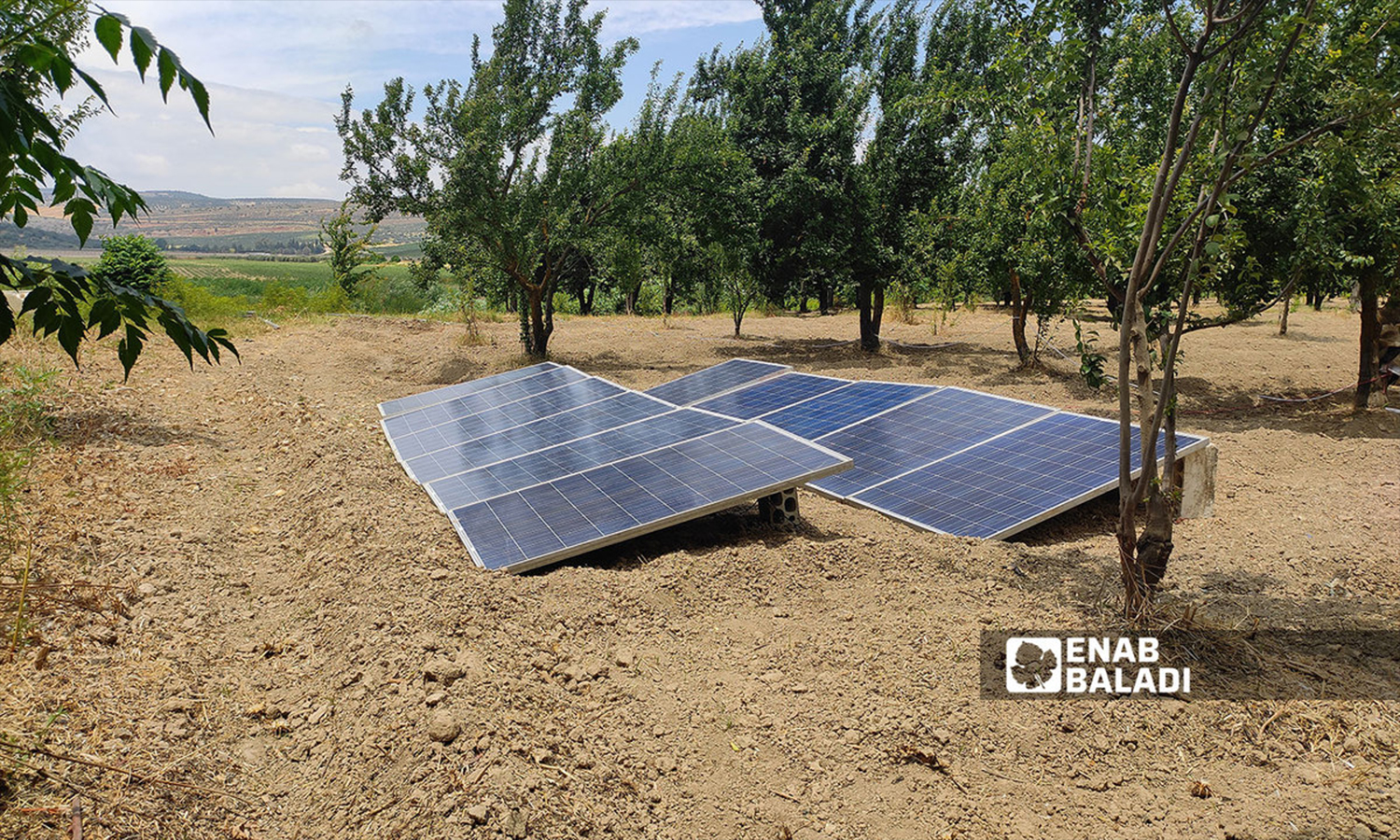



Enab Baladi – Western Idlib Countryside
The areas of the western countryside of Idlib, including the plains of the Orontes River basin, extending from the town of Darkush to Azmarin, have witnessed a transformation in the methods of irrigating crops since the beginning of this year.
The majority of farmers dispensed with watering using diesel engines as a result of the high inflation in fuel prices and the difference in the exchange rate with the conversion of the majority of daily transactions in Idlib governorate to the Turkish lira in June 2020 by the Salvation Government, which administratively runs parts of Idlib and the countryside of Aleppo and Hama.
According to what Enab Baladi observed, the majority of farmers in Darkush have started buying solar energy systems for irrigation due to the low cost of irrigation using them and the fact that they work all day from sunrise to sunset on natural energy.
The plain extending from Darkush farms to Azmarin was irrigated by an irrigation project that covered it all. Even before the project was stopped, the farmers did not need pumping engines at all, as the project covered the irrigation needs of everyone.
The project pumped water from the Orontes River, specifically in the Hafriya area, to a high place where the water is collected, and then it is distributed to the plain on a regular basis and on a weekly basis, with small fees compared to the services it provides. However, this project was stopped at the beginning of 2012, and all its equipment was stolen.
Farmer Ghassan Ahmed, 45, told Enab Baladi, “We never gave any importance to the issue of irrigation, it was just that we open the watering spout, which is located at the front of our land, and the water comes to us immediately. We did not need to start the engine, repair it, or supply it with diesel and oil, but today watering is very expensive, and we are reducing irrigation from once a week to once every 15 days, which has negatively affected our crops.”
The majority of farmers searched for alternatives to securing electricity as one of the basic watering needs due to the frequent rise in fuel prices, the difficulty of obtaining it at times, and the continuous power cuts with the increase in the number of rationing hours.
But at the same time, the high cost of solar energy systems makes it difficult for the majority of farmers to secure them, Ahmed said.
“Solar energy is excellent, but its cost when buying for the first time is expensive, apart from the periodic maintenance,” the farmer added.
The prices of solar energy systems range according to the distance of the land from the Orontes River or from the water well. The farther the river is, the higher the cost, and most of them are sold in US dollars.
Prices start from 1000 US dollars and sometimes amount to 2500 US dollars, paid once, and then will operate without cost at all, except for system maintenance.
“It is true that the cost of solar energy is high, but it is paid once, and therefore it is cheaper in the long run than relying on gasoline, whose price increases frequently and rapidly,” says Ahmed.
Several organizations worked on irrigation projects in the area by distributing solar energy systems to farmers in the low-income category. They combined every six orchards together and gave farmers systems to relieve them of the financial cost burden.
According to what Enab Baladi observed in the town of Darkush, there are a large number of farmers who have partnered with their neighbors to purchase solar energy systems, in order to reduce their high prices, according to the farmer Khaled Darkushi, 47, who partnered with his four neighbors.
“My four neighbors and I share a large energy system, the payment becomes less, and we are all satisfied. After installing the system, we started growing summer vegetables; previously, we were not able to do that; we used to reduce the watering a lot in order to save fuel,” Darkushi said.
The Watad Petroleum Company, which operates in the areas of influence of the Salvation government in northwestern Syria, raised on 31 May the prices of fuels and oil derivatives to unprecedented levels in Idlib governorate, justifying this by the rise in global oil prices.
The price of a liter of high-quality imported gasoline reached a dollar and 367 US cents, the gas cylinder price reached 13 dollars and 13 cents, the price of European diesel reached 952 cents, and that of the improved type 676 cents, and the price of refined diesel 572 cents.
The solar energy system contains a panel, wires, batteries, and a device responsible for regulating electricity and managing loads, known as an “inverter,” which increases the cost of adopting solar panels as an alternative to fuel.
if you think the article contain wrong information or you have additional details Send Correction